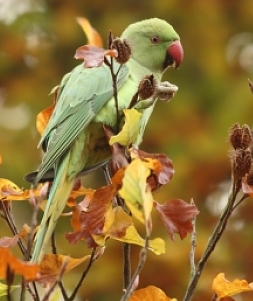Parakeet project calls for a flock of bird-spotters in South-East England

Volunteers are needed to help Imperial scientists carry out a regular census of Rose-ringed Parakeets, small but noisy green birds living in London and the South-East of England - News
by Simon Levey
24 June 2011
People across the South-East of England are being asked to take part in a survey to count the number of Rose-ringed Parakeets living in the area. Volunteers are needed to help carry out a regular census of these small, but noisy, green birds, which have settled in England over the last fifty years.
See also:
Related news stories:
Media stories on this research:
Parakeets, which are a relative of the parrot and budgerigar, first came to the UK from Africa and Asia as exotic pets, but now many have escaped and settled in our parks and gardens. Researchers from Project Parakeet at Imperial College London hope to use the survey data to assess how these birds could impact on our native British bird populations, as well as their potential effect on agriculture.
Hannah Peck, the project leader, and a PhD student in Imperial's Department of Life Sciences, explains why they are so interested in the number of parakeets: "In their native range, parakeets are a big agricultural pest, destroying fruit and other important crops. There's the potential that if the numbers got too big here, they could have a big impact on agriculture here in the UK and cause economic problems for farmers.
"The bigger the population is, the more likely it is they're also going to be competing with our native birds, either through using their nest spaces - cavities in trees - or through feeding competition - eating food that other native birds are eating. Our research is looking into the ecological impacts on native wildlife and what the potential agricultural impacts are."
The birds are controversial, considered by some to be a local menace, making noisy chattering sounds as they roost around sunset, depositing a considerable mess in people's gardens and regularly eating from fruit trees and bird feeders. Other people find these brightly coloured, charismatic birds a welcome exotic addition to their gardens.
The 3 July survey is the seventh one that Project Parakeet has run and the video to the right shows the last survey, which took place in April 2011.
Hannah is joined by teams of keen-eyed parakeet spotters once every three months at all the known roost locations around the South-East. Together, they count the birds, who return in their thousands to roost in the trees each evening.
Richard Haydon, who is a regular volunteer and a keen parakeet counter, said: “It sounds simple, but it really is fun. The first one will come in, just as you think oh there aren't any coming in, and then suddenly *whoomf* in they all come."

A rose-ringed parakeet roosting in the UK. Photograph: Charlie Marsh
Hannah and her colleagues are using the data collected by volunteers to compare the size of the parakeet populations from one season to the next and keep track of how this is changing over time. They have been studying the parakeet populations for eighteen months now and are beginning to analyse their data to get a true picture of the size of the UK population and how fast it is growing.
The team hopes to increase the number of volunteers to help cover all the roost sites simultaneously in order to get an accurate estimate of the population size. The results will help scientists understand the population dynamics and ecological impacts of this rapidly growing invasive species and inform policies for managing the populations.
Parakeet surveys are taking place across the South-east of England at three-monthly intervals. Please email parakeet@imperial.ac.uk to register your interest in taking part. Can't make it to the count? Check out the Project Parakeet website for other ways you can help or to report a sighting of parakeets in your area.
Article text (excluding photos or graphics) © Imperial College London.
Photos and graphics subject to third party copyright used with permission or © Imperial College London.
Reporter
Press Office
Communications and Public Affairs
- Email: press.office@imperial.ac.uk

